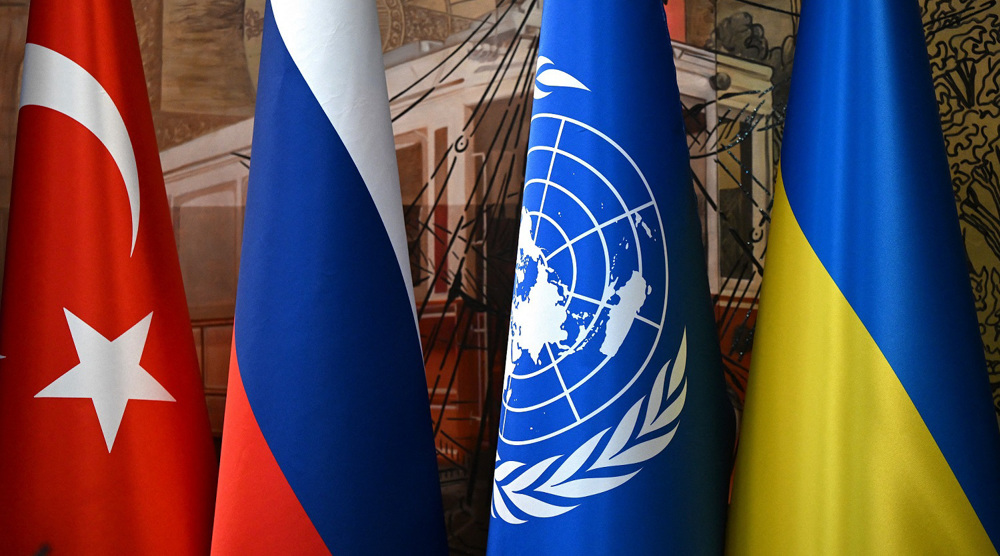Russian FM says grain deal with Kiev stands despite missile attack on Ukraine’s Odessa
Russian Foreign Minister Sergey Lavrov says the missile attack on Ukraine’s Odesa port did not target the grain terminal of the port city and has not created any obstacles to the implementation of a recent grain deal signed between the two countries.
Speaking at a press conference, along with the Foreign Minister of the Republic of Congo Jean-Claude Gakosso, on Monday, Lavrov said there are no barriers to the export of grain from Ukrainian ports, emphasizing that the strike on Odesa port was aimed at military infrastructure there.
He added that there was nothing in the grain agreement signed by Russia to prevent it from continuing to attack military infrastructure in Ukraine.
"Speaking about the episode, which you mentioned that happened in Odesa, there is nothing in the commitments that Russia signed up to in Istanbul on July 22 that would prohibit us from continuing our special military operation, destroying (Ukrainian) military infrastructure and other military targets," Lavrov said.
"As far as the targets hit by high-precision strikes are concerned, they are located in a separate part of Odessa port, in the so-called military part of Odessa port. These targets were a Ukrainian Navy combat cutter and an ammunition depot, to which anti-ship Harpoon missiles were recently delivered. They were delivered to threaten the Russian Black Sea fleet," he added.
Since Moscow began its military operation in Ukraine on February 24, between 20 million and 25 million tons of grain have been blocked in Ukrainian ports.
The two warring countries, which jointly account for nearly a third of global wheat supplies, signed a landmark deal on Friday with the United Nations and Turkey aimed at relieving a global food crisis triggered by blocked Black Sea grain deliveries due to the current war in Ukraine.
Russian forces launched a missile attack on Odessa, a port city on the Black Sea in southern Ukraine, destroying military infrastructure there. Russian Foreign Ministry spokeswoman Maria Zakharova confirmed that the attack was carried out by “Kalibr missiles … with a high-precision strike.”
Odessa is one of the three export hubs designated in the agreement.
The missile attack infuriated Kiev, with Ukrainian President Volodymyr Zelensky condemning it as “barbarism” and a “cynical” move, and alerted the UN and the West that it may derail the hardly-achieved grain agreement.
Earlier on Monday, the Kremlin brushed aside Western and Ukrainian alarm that the missile strike could derail the UN-brokered grain deal reached on Friday in Istanbul.
In a statement, Kremlin spokesman Dmitry Peskov stressed that “These strikes are connected exclusively with military infrastructure,” adding, "“They are in no way related to infrastructure that is used for the export of grain. This should not affect - and will not affect - the beginning of shipments.”
First grain shipments to leave Ukraine ‘this week’: Kiev
Separately on Monday, Ukraine’s Infrastructure Minister Oleksandr Kubrakov said that the Ukrainian government expected the first grain deliveries under the UN-mediated deal to leave Ukrainian ports “this week.”
“We expect the agreement to start working in the coming days. We are preparing for everything to start this week,” added the minister, who led Ukraine’s delegation at grain talks in Turkey.
“We are preparing for everything to start this week,” Kubrakov stressed at a press conference.
The Ukrainian minister further emphasized the importance of security following the missile attack on Odessa.
“Our position is very simple. We signed an agreement with the UN and Turkey. If the sides guarantee security, the agreement will work. If they do not, it will not work,” Kubrakov noted.
The minister added that de-mining would take place “exclusively” in the shipping lanes to be used for grain exports, while Ukrainian ships will accompany the leaving convoys that would transport not only grain but also fertilizer.
Kubrakov’s Deputy Yuri Vaskov said at the same presser that the southeastern port of Chornomorsk would be “the first” used for grain deliveries, followed by the port of Odessa in the south and then, Pivdennyi in the southeast.
“In the next two weeks, we will be technically ready to carry out grain exports from all Ukrainian ports,” Vaskov added.
Maduro’s abduction: China says US cannot act as world’s ‘police’ or ‘judge’
VIDEO | Australians protest over US action in Venezuela
Cuba declares national mourning for 32 citizens killed in US raids on Venezuela
Iran: US must release kidnapped Venezuelan president
After US aggression against Venezuela, Mexico could be next: Report
Qalibaf: Protesters must be heard but foreign-linked agitators will be dealt with
VIDEO | German government refuses to condemn US aggression against Venezuela
Venezuela’s acting president calls for peaceful coexistence, dialogue with US












 This makes it easy to access the Press TV website
This makes it easy to access the Press TV website